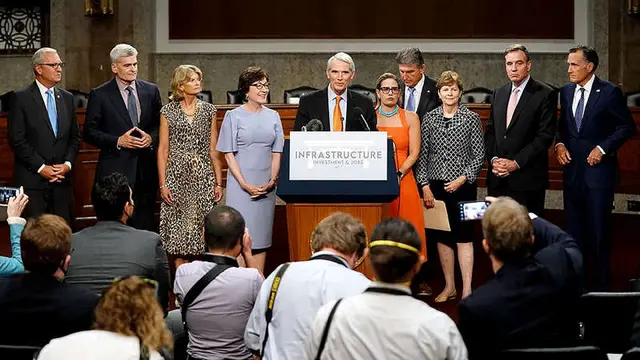Lost in the swirling debate over the reconciliation package, the budget, and the debt ceiling, is a simple but powerful reality: A historic infrastructure bill that passed the Senate in June with support from both parties, including all the Democrats, has been sitting idle in the House for more than a month.
That such a bill, already passed by a Senate so frequently blamed for bottling up good ideas, is now stuck in the House is a commentary on what ails our politics most. Both sides prize the other side losing more than they value the nation's well-being, and they can't just take a win when it is staring them both in the face. Legislators in the sort of bind the Democratic majority now finds itself can't even imagine the idea of opening serious negotiations across the aisle. Look at what's happening: Reporters and pundits are hanging on any inkling of news about what's happening between and among Democrats. Few can even conceive the idea that there might be a bipartisan way forward.
The situation in Washington would be humorous if it weren't so harmful to the country. Most members of both houses, the administration, and three quarters of the American people, see infrastructure as something the country badly needs. In today's politics, however, national needs are less something Congress "must pass" than they are hostage opportunities for strategic partisan priorities. Remember, every member of the Senate Democratic Caucus, including liberal members such as Sens. Bernie Sanders and Elizabeth Warren, voted for the infrastructure bill now awaiting passage in the House. But the Democratic left in the House is now trying to use its passage as leverage to force through a $3.5 trillion reconciliation package supported exclusively by (some) Democrats.
Republicans have taken the same position, but in reverse. They accept the Democratic idea of linkage of the two bills, but are trying to use the bipartisan infrastructure bill to stop the progress of the partisan reconciliation package. They appear to have decided that bipartisan passage of the infrastructure bill would somehow make it easier for Democrats to pass the $3.5 trillion reconciliation package. If that were true, far left members in the House would be rooting for the infrastructure bill's passage instead of threatening to "tank" it. Some have estimated that as many as 100 House GOPers would vote for the infrastructure bill if it were not linked with reconciliation. But now that Republicans are linking the two, perhaps because some believe it would be politically advantageous to deny the White House a bipartisan win, their leadership is leaning on rank-and-file members to vote against it.
In a political system where logic and goodwill prevailed, the solution to this core problem would be obvious: The two sides, each holding hostage something they both want to become law, would work out a deal across the aisle. Moderate Democrats, many of whom were instrumental in shaping the infrastructure bill that passed the Senate, would negotiate seriously with moderate Republicans to break the linkage between the two bills. They would explore in depth what it would really take for them to show up en masse to vote yes on the infrastructure bill and to work together on other domestic policy priorities the president cares about and the nation needs.
Instead, Washington seems to have lost touch with the real world, and a very different dynamic has emerged: The moderate Democrats appear to be negotiating almost exclusively with the intransigent progressive wing with the intention of cutting a Democrats-only deal that explicitly links the bipartisan infrastructure bill that passed the Senate with the single-party reconciliation package that has yet to be hammered out. So, the nation waits with bated breath to see whether the Democratic Party can get its act together in service of getting at least something done on either front.
This situation - one in which politics and miscommunication stand a good chance of putting a bill the country and overwhelming majorities of both the House and Senate appear to support - will become one more example of why so many have lost faith in the institutions of our democracy.
The deadline for a true bipartisan solution is this coming Monday, when the House is scheduled to take a vote on the infrastructure bill. If, in these last few days, those with the courage to reach across the aisle do so, the Senate's hard work may be salvaged. If not, however, the infrastructure bill likely will become wedded to the single-party reconciliation bill. At that point, those who never had any real interest in building two-party consensus will, once again, have held the nation's greater good hostage to their own partisan interests. Once again, the rest of us will be left to wonder about the road not taken.
(MSN)
 简体中文
简体中文





